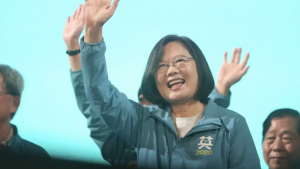Home » Commentary » Opinion » Taiwan votes for sovereignty and against Beijing’s autocracy
· Financial Review
 Taipei: One year ago, there was widespread gloom among Taiwan’s government figures. The ruling pro-independence Democratic Progressive Party had just suffered heavy defeats in local elections. President Tsai Ing-wen’s prospects had been written off.
Taipei: One year ago, there was widespread gloom among Taiwan’s government figures. The ruling pro-independence Democratic Progressive Party had just suffered heavy defeats in local elections. President Tsai Ing-wen’s prospects had been written off.
Yet this weekend, Taiwan’s first female leader was re-elected in a landslide to claim a new four-year mandate. Tsai – a 63-year-old admirer of Margaret Thatcher and former law academic –- defeated the opposition Nationalist leader Han Kuo-yu in the best result for any presidential candidate since Taiwan began holding democratic elections in 1996. The DPP also maintained its legislative majority.
Taiwan’s resilient economy contributed to the victory, but Tsai’s dramatic political comeback is widely seen as a rebuke to Beijing’s attempts to impose its will and influence on this robust island democracy of 24 million people.
In recent months, Xi Jinping has intensified air and naval military exercises to intimidate Taiwan and diplomatic efforts to isolate it. Voters have been flooded with disinformation campaigns that many believe the Chinese Communist Party were behind. In November, an alleged Chinese spy told Australian authorities that he helped funnel money into the campaigns of Tsai’s opponents who favour closer ties with Beijing.
Hong Kong’s anti-China protests also strengthened Tsai’s hand, because they exposed what Beijing’s “one country, two systems” might look like. Meanwhile, the US decision to upgrade diplomatic exchanges and sell advanced military aircraft to Taiwan to help deter a possible Chinese attack helped Tsai, who has enjoyed the closest relations with Washington in nearly 50 years.
All this meant that Tsai could cast the election as a choice between Taiwan’s sovereignty and freedom and caving to Beijing’s autocratic pressure in exchange for economic benefits. She rebuked Xi’s demand for reunification and passed popular anti-foreign interference laws.
At the same time, her main challenger Han, supported by predominantly older Taiwanese, appeared to kowtow to Beijing. Asked a simple question on a late-night TV show, “Which country poses the biggest threat to Taiwan?”, he gave a rambling and incoherent answer before challenging the host to a weird stage act. He never recovered.
The emphatic DPP victory represents another setback for Beijing. It is of particular relevance to Australia. In recent months, several Sinophiles have argued that our nation indulges in anti-China hysteria. Concerns about Beijing’s interference in our politics and universities amount to some kind of panic. Security hawks exaggerate the “red” threat. Canberra, we are told, is out of step with a region that is accommodating the rise of a superpower.
However, anxieties about China are hardly confined to Australia. And Taiwan’s election result is just one of many examples of growing regional concerns about a rising China.
Hong Kong’s anti-China protests culminated in the landslide victory of pro-democracy candidates in district council races in November. Indonesia, Malaysia, Vietnam and The Philippines continue to challenge Beijing’s territorial claims in the South China Sea. India and Japan engage with Washington to check China’s power.
All this as Taiwan’s politics has shifted dramatically against China. Polls show that about 70 per cent oppose the notion that both sides of the Strait belong to “one China” and 60 per cent of those aged between 20 to 34 now support full independence. Walk around the lively DPP campaign rallies this weekend and you get the sense that every year Taiwan preserves its autonomy, it becomes less likely it will return to China.
Some foreign-policy scholars say time is on China’s side. Taiwan, which Beijing sees as a mere renegade province, is in deep trouble if China continues to grow at an impressive rate. Perhaps.
But that outcome is a long time off and who knows what can happen between now and then. China has very real weaknesses and limitations, the US remains deeply engaged in Asia, and Taiwan, like Hong Kong, has the weight of international opinion firmly on its side.
So it makes sense for the US, Australia and like-minded allies to maintain close relations with Taiwan, but to make sure Taipei does not provoke China into attacking it.
Ever since Richard Nixon and Gough Whitlam visited China in the early 1970s, both Washington and Canberra have adhered to a One China policy, in which we acknowledge the Chinese view that there is but one China and that Taiwan is part of China.
Our interests on this issue are best served by maintaining a status quo that balances de facto autonomy with formal ambiguity of status for Taiwan. Anything that tilts that balance – in either direction – could make us a prisoner of events.
Taiwan votes for sovereignty and against Beijing’s autocracy